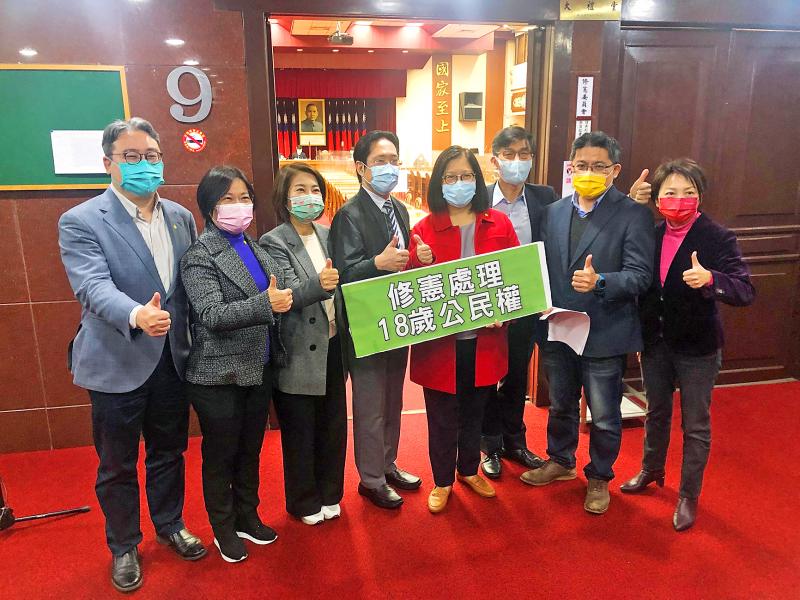A constitutional amendment that would see the voting age lowered to 18 from 20 passed a committee review at the legislature in Taipei yesterday.
The Constitutional Amendment Committee approved the amendment, which was cosponsored by the ruling Democratic Progressive Party (DPP), the Taiwan People’s Party (TPP) and the New Power Party (NPP), and which seeks to bring the voting age in line with most other democratic nations.
Barring objections or proposed revisions requiring inter-party negotiations, the bill will undergo a second reading later this week.

Photo: CNA
Fourteen Chinese Nationalist Party (KMT) legislators did not attend the meeting as part of an ongoing protest against the DPP for setting the agenda for the 39-member committee in a meeting on Jan. 6 without them being present.
The proposed amendment would grant Taiwanese who are 18 or older the right to vote. It would also pave the way for further legislation to lower the minimum age for running as a candidate in an election from 23 years old.
At a news conference prior to the committee meeting, TPP Legislator Jang Chyi-lu (張其祿) said the three parties had reached a consensus over the issue, despite having minor differences, such as where the amendment should be placed in the Constitution.
Jang said he was looking forward to lawmakers setting aside their differences and making progress with the legislation as soon as possible.
NPP Legislator Chiu Hsien-chih (邱顯智) said the constitutional revision is long overdue, as Taiwan had fallen behind many nations that have lowered the voting age to 18.
Chiu said he hopes the amendment would clear the legislature as soon as possible so it could be put to a vote in a referendum.
The additional articles of the Constitution state that amendments must first clear the legislature with the approval of at least three-quarters of lawmakers present at a meeting attended by at least three-quarters of all the lawmakers.
Based on the current distribution of seats in the legislature, where the DPP holds 61 seats and the KMT holds 39, it would take cooperation between the two main parties for any constitutional amendment to be passed.
If an amendment is approved by lawmakers, it must then be voted on in a national referendum and can only pass if half of all eligible voters cast ballots in favor of its passage.
KMT Legislator Chen Yu-jen (陳玉珍) said that the party supported the initiative to lower the voting age, but it strongly opposed the DPP deciding on the committee agenda without negotiating with the KMT, a move she described as lacking procedural justice.
However, even if KMT lawmakers had been present at the meeting on Jan. 6, it was likely that the committee, in which the DPP holds a majority of 21 seats, would have agreed to the DPP’s favored agenda.
DPP Legislator Chou Chun-mi (周春米) urged the KMT to stop boycotting meetings of the committee and take part in the legislative process.

The Central Election Commission has amended election and recall regulations to require elected office candidates to provide proof that they have no Chinese citizenship, a Cabinet report said. The commission on Oct. 29 last year revised the Measures for the Permission of Family-based Residence, Long-term Residence and Settlement of People from the Mainland Area in the Taiwan Area (大陸地區人民在台灣地區依親居留長期居留或定居許可辦法), the Executive Yuan said in a report it submitted to the legislature for review. The revision requires Chinese citizens applying for permanent residency to submit notarial documents showing that they have lost their Chinese household record and have renounced — or have never

A magnitude 5.6 earthquake struck off the coast of Yilan County at 12:37pm today, with clear shaking felt across much of northern Taiwan. There were no immediate reports of damage. The epicenter of the quake was 16.9km east-southeast of Yilan County Hall offshore at a depth of 66.8km, Central Weather Administration (CWA) data showed. The maximum intensity registered at a 4 in Yilan County’s Nanao Township (南澳) on Taiwan’s seven-tier scale. Other parts of Yilan, as well as certain areas of Hualien County, Taipei, New Taipei City, Taoyuan, Hsinchu County, Taichung and Miaoli County, recorded intensities of 3. Residents of Yilan County and Taipei received

Taiwan has secured another breakthrough in fruit exports, with jujubes, dragon fruit and lychees approved for shipment to the EU, the Ministry of Agriculture said yesterday. The Animal and Plant Health Inspection Agency on Thursday received formal notification of the approval from the EU, the ministry said, adding that the decision was expected to expand Taiwanese fruit producers’ access to high-end European markets. Taiwan exported 126 tonnes of lychees last year, valued at US$1.48 million, with Japan accounting for 102 tonnes. Other export destinations included New Zealand, Hong Kong, the US and Australia, ministry data showed. Jujube exports totaled 103 tonnes, valued at

BIG SPENDERS: Foreign investors bought the most Taiwan equities since 2005, signaling confidence that an AI boom would continue to benefit chipmakers Taiwan Semiconductor Manufacturing Co’s (TSMC, 台積電) market capitalization swelled to US$2 trillion for the first time following a 4.25 percent rally in its American depositary receipts (ADR) overnight, putting the world’s biggest contract chipmaker sixth on the list of the world’s biggest companies by market capitalization, just behind Amazon.com Inc. The site CompaniesMarketcap.com ranked TSMC ahead of Saudi Aramco and Meta Platforms Inc. The Taiwanese company’s ADRs on Tuesday surged to US$385.75 on the New York Stock Exchange, as strong demand for artificial intelligence (AI) applications led to chip supply constraints and boost revenue growth to record-breaking levels. Each TSMC ADR represents